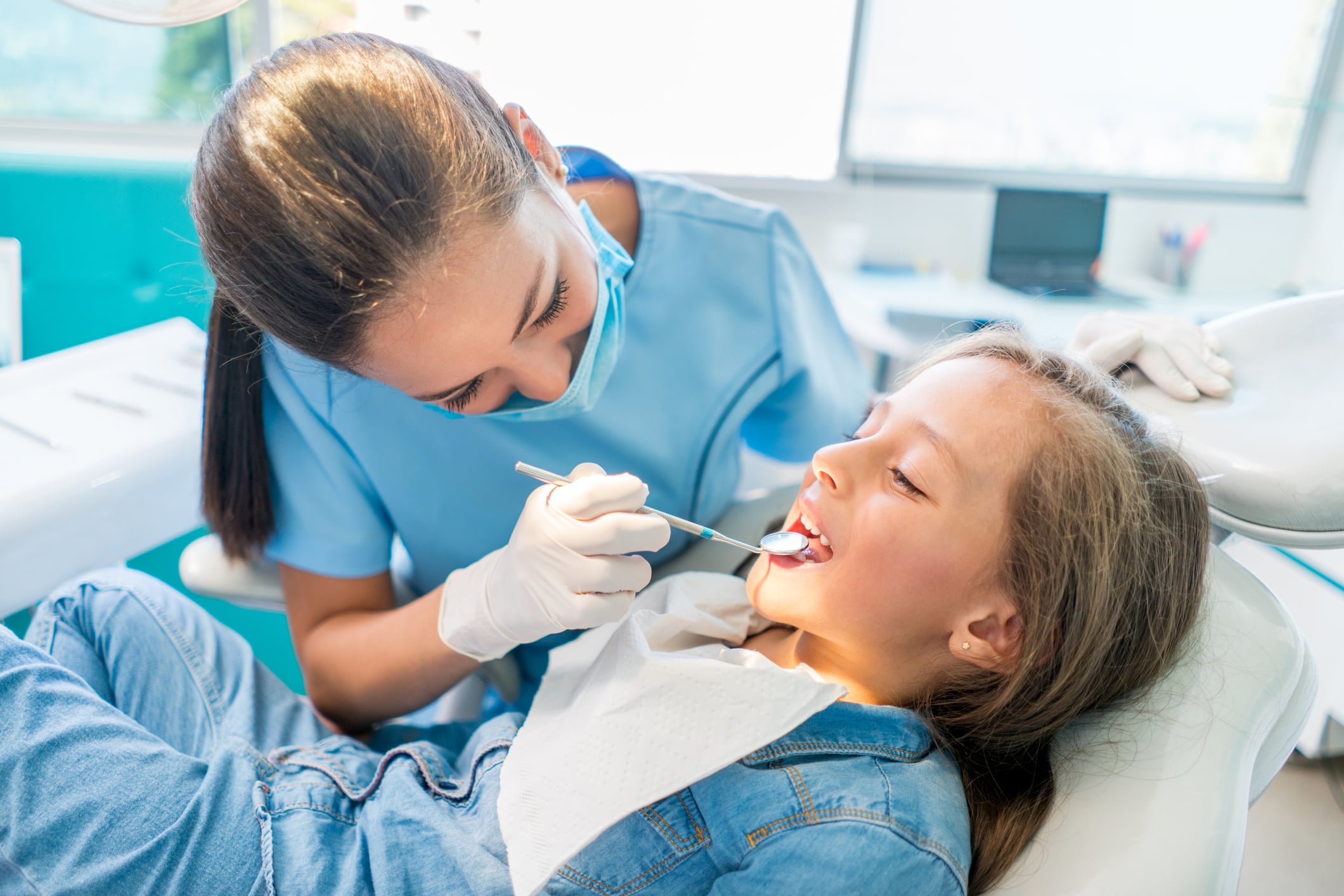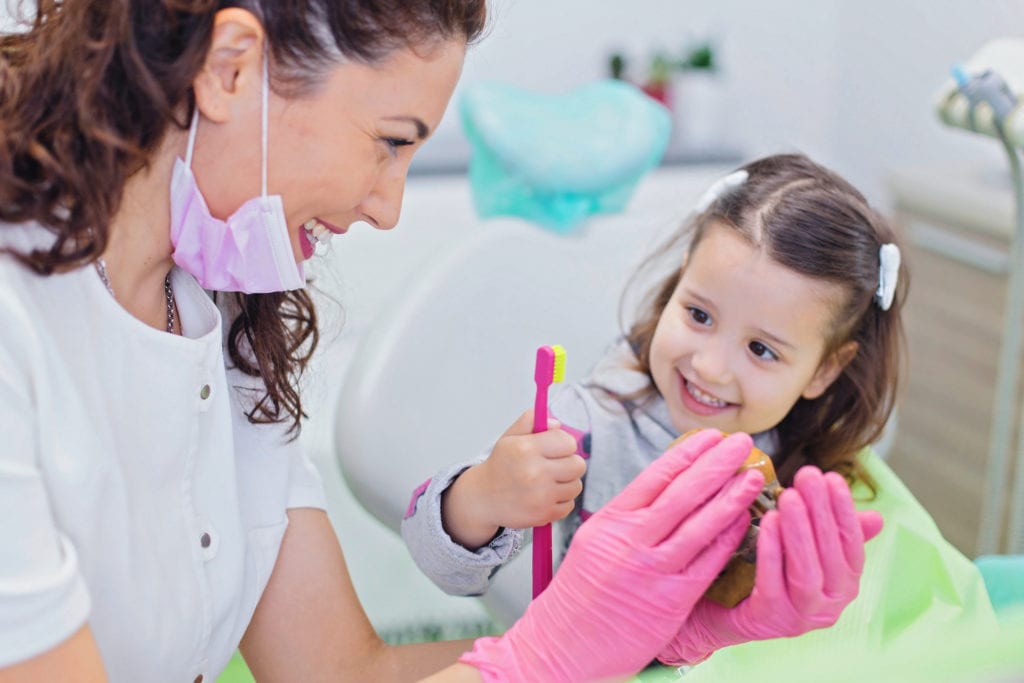Just How Pediatric Dental Care Addresses Unique Dental Needs and Challenges Faced by Growing Children
Pediatric dental care is a specific field that identifies and reacts to the unique dental needs of youngsters as they grow. This method not only minimizes instant oral difficulties but additionally lays the groundwork for lasting dental health.
Relevance of Early Oral Check Outs
Very early dental visits are critical for establishing a structure of good dental health in youngsters. The American Academy of Pediatric Dentistry suggests that a child's very first oral visit take place by their very first birthday celebration or within six months of the eruption of their first tooth. These early consultations offer numerous purposes, consisting of educating parents regarding correct oral hygiene techniques, dietary options, and the relevance of routine oral treatment.
During these sees, pediatric dental experts analyze the child's oral wellness, monitor the advancement of teeth, and determine possible issues such as misalignment or decay. Early treatment can protect against more severe troubles later, ensuring that children establish healthy and balanced oral behaviors and reducing anxiety surrounding dental sees.
In addition, developing a relationship with a pediatric dental expert promotes a feeling of convenience and depend on, making future brows through much less daunting. The dentist can provide tailored advice that aligns with the child's developmental stage, empowering parents to make enlightened choices concerning their youngster's dental health and wellness. On the whole, very early oral sees play a crucial function in advertising lifelong oral health, making them a vital element of pediatric healthcare.
Common Oral Concerns in Kid
Comprehending common dental issues in youngsters is crucial for advertising their oral health and well-being. Children face unique oral difficulties because of their developing teeth and transforming dental atmospheres. Among one of the most common issues are dental caries, commonly resulting from inadequate dental hygiene practices and high sugar intake. Early detection and intervention are critical to stop additional complications.
One more significant worry is malocclusion, which refers to imbalance of teeth. This can lead to problems in eating, speech issues, and raised risk of oral injury. Pediatric dental professionals often suggest orthodontic analyses to address these issues as kids grow.
In addition, dental injury prevails in energetic kids, specifically as a result of sporting activities and play. Injuries can vary from chipped teeth to finish avulsion, requiring prompt evaluation and therapy to maintain oral stability.
Techniques for Handling Oral Stress And Anxiety
Oral stress and anxiety is an usual concern amongst youngsters, commonly coming from unfamiliar atmospheres and worry of discomfort - pediatric dentistry oakland. Handling this anxiousness efficiently is essential to ensure that children obtain required oral treatment without undue tension. Pediatric dental professionals utilize a number of techniques to alleviate stress and anxiety and produce a more comfy experience
First, using an inviting, child-friendly office environment can considerably decrease worry. Vivid designs, playthings, and friendly team assistance develop a sense of security and experience. Furthermore, effective interaction is vital; pediatric dental professionals frequently describe procedures in easy, non-threatening terms to assist debunk the procedure.
Distraction strategies, such as offering earphones with songs or allowing youngsters to view video clips during therapy, can likewise draw away interest from possible discomfort. Moreover, behavior management approaches, including favorable reinforcement, motivate cooperation by applauding children permanently behavior.

Duty of Preventive Care
Precautionary care plays a vital duty in pediatric dentistry, concentrating on maintaining oral wellness and avoiding prospective concerns before they occur. By applying a proactive method, pediatric dental practitioners aim to educate both kids and their caretakers concerning the significance of oral health and normal oral visits. This education includes direction on correct cleaning and flossing techniques, as well as the importance of a balanced diet plan in advertising oral wellness.
Normal oral exams are necessary for very early detection of tooth cavities, misalignment, and various other dental health and wellness worries. During these gos to, pediatric dental professionals can use fluoride therapies to enhance enamel and offer dental sealers to secure against decay in at risk locations of the teeth. Furthermore, these check-ups work as a chance for dental professionals to keep track of the growth of a kid's teeth and jaws, ensuring that any kind of irregularities are addressed without delay.
Moreover, pediatric dental professionals often analyze kids's practices such as thumb-sucking or prolonged pacifier use, which might affect oral alignment. By resolving these routines early, preventive treatment not only promotes a healthy and balanced smile yet also imparts lifelong oral wellness methods in children, establishing the foundation for a life time of excellent oral hygiene.

Transitioning to Teen Dentistry
As youngsters establish and grow, their oral requirements evolve, leading to distinctive considerations in teenage dentistry. This change marks an important period where the mouth goes through significant modifications, consisting of the eruption of permanent teeth and the possible onset of orthodontic worries. Teens typically experience medicaid find a dentist raised independence, which can influence their dental hygiene methods and nutritional choices, requiring customized educational techniques.
Throughout this stage, dental experts concentrate on preventive care and early treatment approaches. Regular examinations come to be pivotal for keeping track of the growth of teeth and jaw alignment, identifying problems such as dental caries, gum tissue disease, and malocclusion. Teenagers likewise call for assistance on handling dental wellness challenges linked with hormone adjustments, such as raised sensitivity to gingivitis.
Furthermore, the psychosocial facets of oral treatment are essential; dental anxiety may peak during adolescence, making it important for professionals to utilize efficient communication techniques to ease concerns. By cultivating a favorable dental experience, specialists can encourage lifelong oral wellness habits. Transitioning to teenage dental care is not simply a shift in treatment modalities yet a thorough strategy to sustain the special developing and mental needs of expanding individuals.
Final Thought
Finally, pediatric dentistry plays a vital duty in resolving the distinct oral demands of kids through very early intervention, effective monitoring of typical dental concerns, and the application of preventive treatment techniques. By creating an encouraging atmosphere and using methods to reduce anxiousness, pediatric dentists promote positive oral experiences that encourage lifelong dental health behaviors. The shift to teenage dentistry better makes sure that the evolving oral needs of expanding individuals are satisfied with specialized care and proficiency.
Pediatric dental care is a specialized field after hours dentist that identifies and responds to the unique oral requirements of kids as they expand (pediatric dentistry oakland). The American Academy of Pediatric Dentistry suggests that a child's very first oral go to happen by their initial birthday or within six months of the eruption of their initial tooth. By implementing a positive strategy, pediatric dental professionals intend to enlighten both children and their caregivers regarding the relevance of oral hygiene and routine oral visits.Furthermore, the psychosocial elements of oral care are essential; dental stress and anxiety might come to a head during adolescence, making it vital for professionals to use effective communication techniques to minimize anxieties.In verdict, pediatric dentistry plays a vital role in dealing with the one-of-a-kind oral demands of youngsters via very early intervention, effective management of site common dental issues, and the application of precautionary care techniques